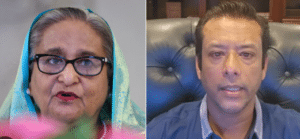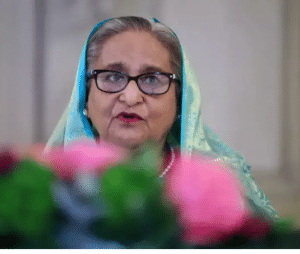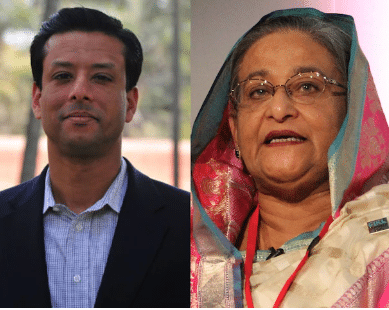Keywords: Sheikh Hasina, Bangladesh elections, political crisis, Muhammad Yunus, Sajeeb Wazed Joy, Awami League, Bangladesh protests, New Delhi, political asylum, South Asia stability.
New Delhi, India Former Bangladeshi Prime Minister Sheikh Hasina, who recently fled to India following widespread protests, will return to Bangladesh once the newly-formed caretaker government schedules elections, her son, Sajeeb Wazed Joy, revealed in an interview with the Times of India.
Sheikh Hasina, 76, sought refuge in India earlier this week after violent demonstrations forced her resignation. The unrest, which led to approximately 300 deaths and thousands of injuries, culminated in her decision to step down. A caretaker government, led by Nobel Peace laureate Muhammad Yunus, was sworn in on Thursday, tasked with guiding the nation through a turbulent period and ensuring a fair electoral process.
“My mother is currently in India, but she will return to Bangladesh the moment the interim government decides to hold an election,” Wazed Joy stated. However, he did not clarify whether Hasina would participate in the upcoming elections. “My mother had intended to retire from politics after her current term,” he added.
Wazed Joy, who resides in the United States, admitted that recent events in Bangladesh have drawn him into the political arena, despite his prior lack of political ambition. “I was settled in the US with no plans to enter politics. But given the leadership vacuum in Bangladesh, I felt compelled to step up for the sake of the party,” he explained.
The political landscape in Bangladesh remains uncertain, with Sheikh Hasina’s Awami League party notably absent from the interim government following the student-led uprising that contributed to her ouster. Hasina is currently staying in a safe house in the New Delhi area, and while there are rumors that she might seek asylum in Britain, the British Home Office has not commented on the matter.
India’s foreign minister confirmed discussions with his British counterpart regarding the situation in Bangladesh, though no further details have been disclosed.
The coming weeks will be crucial as Bangladesh navigates its way through this political crisis, with the nation eagerly awaiting the announcement of the election date and Sheikh Hasina’s potential return.

Backdrop of Political Crisis
Sheikh Hasina, who served as Prime Minister for a total of over 20 years across multiple terms, was forced to resign earlier this week after violent protests rocked the nation. The protests, initially sparked by accusations of corruption and authoritarianism, escalated into widespread violence, leading to approximately 300 deaths and thousands of injuries. The situation became untenable as student-led movements gained momentum, demanding her resignation and the formation of an impartial interim government to oversee the electoral process.
On Thursday, Nobel Peace laureate Muhammad Yunus was sworn in as the head of a caretaker government, tasked with restoring order and guiding Bangladesh to a free and fair election. Yunus, known internationally for his work in microfinance and poverty alleviation, now faces the daunting challenge of stabilizing a deeply divided nation.
Seikh Haseena exile and uncertain Future
Sheikh Hasina fled to neighboring India on Monday, where she is currently residing in a secure location in the New Delhi area. Speaking to the Times of India, her son, Sajeeb Wazed Joy, indicated that Hasina is prepared to return to Bangladesh as soon as the caretaker government schedules elections. However, he did not confirm whether she intends to run in the upcoming elections.
“For the time being, she is in India. She will go back to Bangladesh the moment the interim government decides to hold an election,” Wazed Joy stated. He added, “My mother would have retired from politics after the current term.”
Wazed Joy, a prominent technocrat and advisor in Hasina’s previous administration, has largely remained in the United States, where he is settled. However, recent events have drawn him back into the political fray. “I never had any political ambition and was settled in the US. But the developments in Bangladesh in the past few days show that there is a leadership vacuum. I had to get active for the sake of the party and I am at the forefront now,” he said.
Political Implications and Future Prospects
The future of Bangladesh’s political landscape remains uncertain. The Awami League, Hasina’s party, has been a dominant force in the country’s politics since its independence in 1971. However, its exclusion from the interim government highlights the deep divisions within the nation and the challenges ahead.
The opposition, led by the Bangladesh Nationalist Party (BNP), has long accused Hasina of undermining democracy and consolidating power through controversial legal reforms and alleged electoral manipulations. The caretaker government’s success in managing the upcoming elections will be crucial in determining whether Bangladesh can achieve a peaceful transition of power or if it will slide further into instability.
Meanwhile, rumors have circulated that Sheikh Hasina may seek asylum in the United Kingdom, though the British Home Office has refused to comment on the matter. India’s foreign minister has also confirmed discussions with his British counterpart about the ongoing situation in Bangladesh, underscoring the international implications of the crisis.

International Reactions and Concerns
The political upheaval in Bangladesh has drawn significant international attention, particularly from neighboring India, which shares deep historical, cultural, and economic ties with Bangladesh. India has traditionally supported Sheikh Hasina’s government, recognizing her role in maintaining regional stability and countering extremist elements within Bangladesh.
However, the current crisis poses a dilemma for India, as it navigates its relations with a potentially new leadership in Dhaka. The involvement of Muhammad Yunus, a globally respected figure, in the interim government has been welcomed by the international community, though the path to a stable and democratic Bangladesh remains fraught with challenges.
The United States, the European Union, and other global powers are also closely monitoring the situation, given Bangladesh’s strategic importance in South Asia. The international community is likely to play a key role in ensuring that the upcoming elections are conducted fairly and that the rights of all citizens are respected.As Bangladesh stands at a crossroads, the coming weeks will be critical in shaping the country’s future. With Sheikh Hasina’s potential return and the prospect of new elections on the horizon, the nation faces a period of uncertainty and transition. The caretaker government, led by Muhammad Yunus, has a daunting task ahead in restoring peace and guiding the country through these turbulent times.
.
